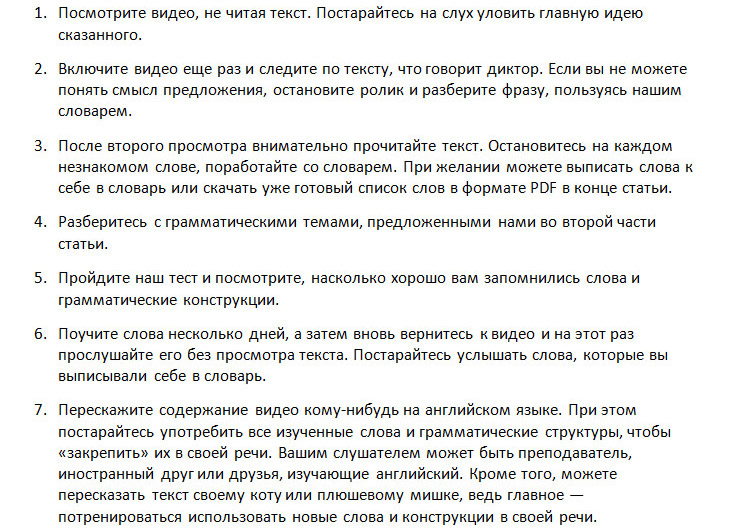Почему мы иногда не осмеливаемся поменять что-то в жизни? И почему мы так переживаем о том, что думают о нас другие? Ответы на эти занимательные вопросы вы найдете в нашем видеоразборе.

Саморазвитием сейчас не занимается только ленивый. Хотя даже лентяи пытаются бороться с бездельем, искать свое внутреннее «я» и активно его развивать. Бизнес-тренинги, книги от лайф-коучей, спорт, ЗОЖ, курсы английского, семинары по личностному росту — все эти занятия находят место в наших ежедневниках. Сегодняшнее видео посвящено способности сохранять уверенность в себе несмотря ни на что.
Для начала советуем почитать инструкцию о том, как пользоваться этой статьей, чтобы она принесла наибольший эффект. Статья подойдет студентам с уровнем Advanced и выше.

How to be confident. — Как стать уверенным в себе.
| Текст | Словосочетания |
|---|---|
| In well-meaning attempts to boost our confidence ahead of challenging moments, people often try to draw our attention to our strengths: our intelligence, our competence, our experience. | well-meaning — из лучших побуждений, с лучшими намерениями to boost smb’s confidence — повысить уверенность в себе to draw smb’s attention to smth — обращать чье-то внимание на что-то competence — компетентность |
| But this can — curiously — have some awkward consequences. There’s a type of under-confidence that arises specifically when we grow too attached to our own dignity and become anxious around any situation that might seem to threaten it. | awkward /ˈɔːkwəd/ — нелепый a consequence /ˈkɒnsɪkwəns/ — последствие under-confidence — неуверенность в себе to arise — проявиться to grow too attached to smth — слишком сильно привязываться к чему-либо dignity /ˈdɪɡnəti/ — чувство собственного достоинства anxious /ˈæŋkʃəs/ — тревожный to threaten /ˈθretən/ — угрожать |
| We hold back from challenges in which there is any risk of ending up looking ridiculous which comprises, of course, almost all the most interesting situations. In a foreign city, we might grow reluctant to ask anyone to guide us to the nice bars, because they might think us an ignorant, pitiable, lost tourist. Or at work, we don’t apply for a promotion, in case the senior management deems us delusionally arrogant. |
to hold back from smth — держаться подальше от чего-то to look ridiculous — выглядеть нелепо, смешно to comprise — составлять reluctant /rɪˈlʌktənt/ to do smth — нежелающий что-то делать ignorant — невежественный pitiable — жалкий to apply for a promotion — просить повышение to deem smb arrogant — считать кого-либо высокомерным |
| In a concerted bid never to look foolish, we don’t venture very far from our cocoon, and thereby — from time to time at least — miss out on the best opportunities of our lives. | a concerted bid — решительная попытка to venture from one's cocoon /kəˈkuːn/ — выходить из своего кокона thereby — тем самым to miss out on smth — упускать что-то |
| At the heart of our under-confidence is a skewed picture of how dignified it is normal for a person to be. We imagine that it might be possible, after a certain age, to place ourselves beyond mockery. We trust that it's an option to lead a good life without regularly making a complete idiot of ourselves. | skewed — искаженный dignified — достойный to place oneself beyond mockery — быть недостижимым для насмешек to make a complete idiot of oneself — выставлять себя полным дураком |
| One of the most charming books ever written in early modern Europe is called “In Praise of Folly” by the Dutch scholar and philosopher, Erasmus. In its pages, Erasmus advances a hugely liberating argument. In a warm tone, he reminds us that everyone, however important and learned they might be, is a fool. No one is spared, not even the author. However well-schooled he himself was, Erasmus remained — he insists — as much of a nitwit as anyone else: his judgement is faulty, his passions get the better of him, he is prey to superstition and irrational fear, he is shy whenever he has to meet new people, he drops things at elegant dinners. |
charming — прелестный folly — глупость a scholar /ˈskɒl.ər/ — ученый to advance a hugely liberating argument — приводить неимоверно успокаивающий довод in a warm tone — очень мягко no one is spared — без исключений well-schooled — образованный a nitwit /ˈnɪt.wɪt/ — простофиля a judgement — суждение prey to superstition and irrational fear — объект суеверий и иррациональных страхов to drop — ронять |
| There’s a similarly uplifting message to be pulled from the work of Pieter Brueghel. His central work, “The Dutch Proverbs”, presents a comically disenchanted view of human nature. Everyone, he suggests, is pretty much deranged: here’s a man throwing his money into the river; there’s a soldier squatting on the fire and burning his trousers; someone is intently bashing his head against a brick wall; someone else is biting a pillar. | uplifting — вдохновляющий, позитивный comically disenchanted/ˌdɪsɪnˈtʃɑːntɪd/ — комично правдивый pretty much deranged /dɪˈreɪndʒd/ — довольно сумасшедший to squat — присесть на корточки intently — сосредоточенно to bash one’s head against a brick wall — биться головой о стену a pillar — столб |
| Importantly, the painting is not an attack on just a few unusually awful people — it’s a picture of parts of all of us. Brueghel’s and Erasmus’s work proposes that the way to greater confidence isn’t to reassure ourselves of our own dignity — it’s to grow at peace with the inevitable nature of our ridiculousness. | to reassure smb /ˌriːəˈʃʊər/ — убеждать кого-то to grow at peace with — смириться inevitable — неизбежный ridiculousness — нелепость, смехотворность |
| We are idiots now, we have been idiots in the past, and we will be idiots again in the future... and that's OK. There aren’t any other available options for human beings to be. Once we learn to see ourselves as already, and by nature, foolish, it really doesn’t matter so much if we do one more thing that might make us look a bit stupid. | an available option — другой выбор by nature — от природы |
| The individual we asked directions from in a foreign city might regard us with contempt. But if these people did so, it wouldn’t be news to us — they would only be confirming what we had already gracefully accepted in our hearts long ago: that we, like them — and every other person on the earth — are a nitwit. The risk of trying and failing would have its sting substantially removed. A fear of humiliation would no longer stalk us in the shadows of our minds. We would grow free to give things a go by accepting that failure was the acceptable norm. And every so often, amidst the endless rebuffs we’d have factored in from the outset, it would work: we’d get a kiss, we’d make a friend, we’d get a raise. |
to regard smb with contempt — посмотреть на кого-то с презрением gracefully — изящно to have one’s sting substantially removed — потерять свою силу humiliation /hjuːˌmɪliˈeɪʃən/ — унижение to stalk — преследовать in the shadow of smth — во власти чего-либо to give smth a go — пробовать что-то, давать шанс чему-то a failure — провал, неудача amidst /əˈmɪdst/ — среди endless rebuffs — постоянные неудачи, отказы to factor in from the outset — брать в расчет с самого начала |
Пунктуация для уверенных в себе
Как часто вы задумывались об употреблении дефиса и тире в английском языке? Самое время вспомнить самые распространенные случаи их употребления.
Дефис
Дефис (a hyphen) — короткий соединительный знак между словами. Употребляется в следующих случаях:
- Чтобы соединить два и более слов в одно составное:
There’s a type of under-confidence that... — Есть вид неуверенности в себе, который...
Другие примеры:
- green-eyed — зеленоглазый;
- rough-and-ready — сделанный на скорую руку;
- far-ranging — далекоидущий;
- well-educated — образованный.
- Чтобы присоединить приставку к сложному слову:
- a mini-aircraft — мини-самолет;
- non-negotiable — не подлежащий обсуждению, пересмотру;
- anti-monopoly — антимонопольный;
- a re-arrest — повторный арест.
Тире
Употребляется в следующих случаях:
- Если между частями предложения нужно сделать паузу, наряду с запятой мы можем использовать тире (a dash).
You may think she is a liar — she isn't. — Ты, наверное, думаешь, что она лгунья, но это не так.
She might come to the party — you never know. — Неизвестно, придет ли она на вечеринку. - С помощью тире можно выделять дополнительную информацию или уточнение в предложении.
We, like them — and every other person on the earth — are a nitwit. — Мы, как и они — и как любой другой человек в мире — простофили.
And thereby — from time to time at least — miss out on the best opportunities of our lives. — Таким образом, по крайней мере время от времени, мы упускаем лучшие возможности в нашей жизни. - Тире необходимо при употреблении косвенной речи.
However well-schooled he himself was, Erasmus remained — he insists — as much of a nitwit as anyone else: his judgement is faulty. — Каким бы он ни был образованным, Эразмус оставался, он настаивал, простофилей, как и все: его суждения были далеки от совершенства.
Подробнее о знаках препинания читайте в статье «Пунктуация в английском языке — punctuation in English».
Мы составили для вас удобный файл, в котором вы найдете всю новую лексику из этой статьи. Советуем скачать ее и изучать в свободное время.
Скачать список лексики по теме «Видеоразбор: как стать уверенным в себе» (*.pdf, 311 Кб)
Проверьте себя
Не забудьте закрепить выученные слова с помощью теста.
Мы надеемся, что этот урок по видео был вам интересен и полезен. Совершенствуйте свои знания, правильно используйте тире и дефисы, учите новую лексику, а вместе с тем становитесь увереннее. Если вы сомневаетесь в том, что у вас все в порядке с английским, можете пройти бесплатный вводный урок в нашей школе — преподаватель точно определит ваш уровень знаний и скажет, над чем предстоит работать! Желаем успехов в обучении!